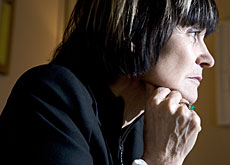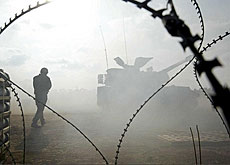Swiss abstain from human rights vote on Lebanon

The United Nations' Human Rights Council has condemned Israel's invasion of Lebanon, but a resolution failed to win the support of Switzerland and several other nations.
It came ahead of a resolution adopted by the UN Security Council seeking a “full cessation” of violence between Israel and Hezbollah.
A majority of 27-11 came out in support of the Human Rights Council’s resolution, proposed by Islamic states, which made no mention of Hezbollah’s attacks on Israel.
Speaking to swissinfo after the vote, the Swiss ambassador to the United Nations in Geneva, Blaise Godet, said the final resolution was not balanced, hence the Swiss abstention.
“We are not enthusiastic about the result, which we consider to be asymmetrical and unbalanced. But it still contains certain elements that we agree with.”
Other European countries as well as Canada and Japan voted against it for the same reason.
The vote is the second held in the Council since it replaced the discredited Human Rights Commission earlier this year.
“The credibility of the new Council is at stake. It needs to find answers to the humanitarian crisis in Lebanon and to end human rights abuses,” Godet said.
In its first vote in July, the Council – set up on a Swiss initiative – passed a declaration condemning Israel’s attacks in the Occupied Territories, which was also put forward by Islamic states.
Offensive
The final resolution also called for an immediate end to Israel’s offensive in Lebanon.
According to Godet, the main consequence of the vote is the decision to send a delegation to investigate alleged human rights violations in Lebanon.
“Unfortunately, we would have liked this mission to investigate all alleged violations, both in Israel and Lebanon, on both sides of the frontier.”
Human rights violations
Godet said that Switzerland had managed to influence the content of the final resolution, even though it could not support the document in its entirety.
“Switzerland was able to insist on a last-minute improvement to the resolution: an appeal for all parties to respect international humanitarian law, to refrain from all acts of violence against civilians, and to treat all detainees in their control in accordance with the Geneva Conventions.”
In his address to the Council before the vote, Godet condemned both parties for their attacks against civilians and called for an immediate ceasefire.
He described Israel’s attacks as “out of proportion”, but recognised “Israel’s right to defend its territory”, saying Hezbollah’s repeated launching of rockets against Israel is a violation of humanitarian law.
Security Council
The Security Council resolution, adopted unanimously, authorizes 15,000 UN peacekeepers to help Lebanese troops take control of south Lebanon as Israeli forces that have occupied the area withdraw.
The Swiss foreign ministry welcomed the resolution.
United States Secretary of State Condoleezza Rice said the “hard work of diplomacy” was only beginning with the passage of the resolution and that it would be unrealistic to expect an immediate end to all violence.
Israeli Prime Minister Ehud Olmert endorsed the resolution late on Friday. Hezbollah leader Sayyed Hassan Nasrallah said on Saturday that his guerrillas would observe the resolution once the timing of the truce was agreed and adhered to by Israel.
He said Hezbollah had the right to resist Israeli soldiers still in Lebanon, but would cooperate with Lebanse soldiers and UN troops due to be deployed to southern Lebanon as part of the Security Council resolution.
UN Secretary-General Kofi Annan said he planned to meet Lebanese and Israeli officials as soon as possible to determine the exact date of a cease-fire.
swissinfo with agencies
Switzerland was elected to the Human Rights Council with a three-year mandate on May 9.
It is one of 47 countries on the new body, which replaced the discredited Human Rights Commission.
The council, which stems from a Swiss initiative, meets three times a year, and can convene emergency sessions.
The UN Human Rights Council has no enforcement powers. It aims to exert moral pressure on countries it deems to be violating UN accords.
Decisions can be approved by majority vote. Neither Israel nor the United States has seats on the Council.
The request for a special session followed a meeting of the Organisation of the Islamic Conference in Malaysia last week.
Such sessions can be called if requested by a minimum of one third of the membership. A special session was also held in July, at which Israel was condemned for attacks in Gaza.

In compliance with the JTI standards
More: SWI swissinfo.ch certified by the Journalism Trust Initiative












You can find an overview of ongoing debates with our journalists here . Please join us!
If you want to start a conversation about a topic raised in this article or want to report factual errors, email us at english@swissinfo.ch.